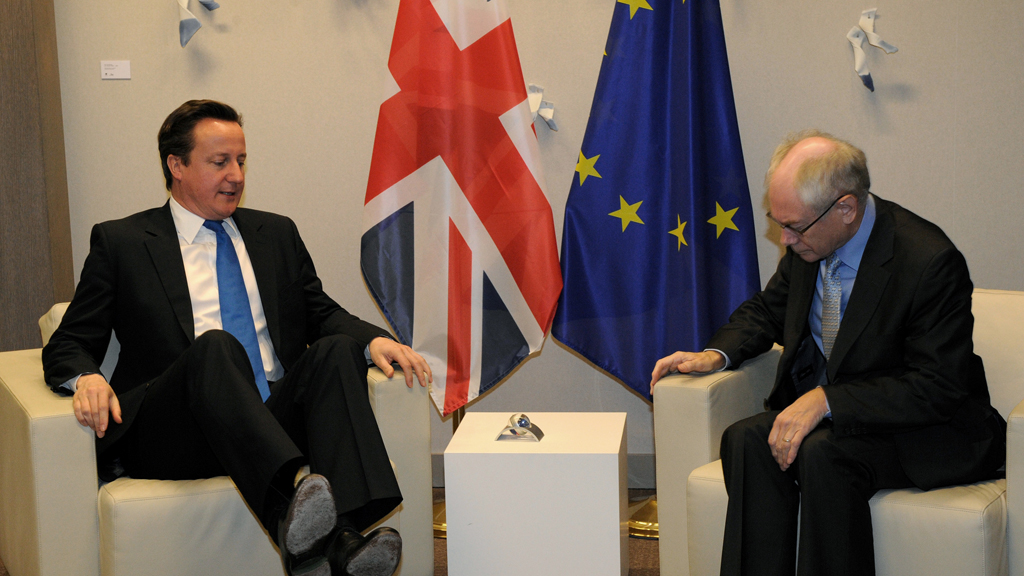EU budget: what Britain pays and where it goes
With some Conservative MPs posing a threat to EU budget vote in the House of Commons, Channel 4 News looks at what Britain pays towards the EU budget and how it is spent.
How much does UK contribute to EU budget?
After the 3.56bn euros rebate is taken into account, the UK’s net contribution was 7.25bn euros (£5.85bn), according to the EU financial report.This represents around 0.87 per cent of UK public spending in 2011 – approximately the same amount spent on the NHS.
The UK is the sixth highest contributor per capita, with a net contribution of around 115.2 euros per person.
How much does it get back?
This figure is difficult to get hold of. Eurosceptics say that the UK pours in more money that it gets back, and the UK certainly benefits less than other countries – which is why Margaret Thatcher was able to negotiate a rebate. The European Commission on the other hand estimates that that the single market brings between £30bn and £90bn a year into the UK economy: or between five and fifteen times the UK net contribution.
Why are some Conservative MPs rebelling?
The European Commission has proposed a 5 per cent rise compared with the 2007 to 2013 budget – a £826bn budget ceiling for the 2014 to 2020 budget.
David Cameron said he would ideally like to see the UK’s contribution cut. But he is being pragmatic, and says that won’t be accepted by the EU. Instead, he will push for a real terms budget freeze.
However that is not enough for eurosceptic Conservative MPs such as Mark Reckless and Mark Pritchard, who are tabling a motion saying that any budget rises should be below inflation.

Read more: Cameron faces Commons rebellion on Europe
What are they proposing?
MPs have been given a choice by the speaker: to vote for a budget cut, or to back the government’s call for a freeze.
The group of rebel MPs say that Britain can’t afford to increase spending – and that it doesn’t get enough back to merit what it spends already.
They argue that even if Britain ends up vetoing the budget at next month’s EU summit, it will end contributing less than it would if David Cameron’s budget freeze was agreed (once the rebate is considered). This is because the European Commission has agreed a default budget rise of 2 per cent to account for inflation from 2014, if the 27 member states fail to reach an agreement.
Do they have a point?
The Tory rebels have the backing of Labour, but not the entire Conservative party. Andrea Leadsom MP said the amendment was not the right option for Britain, as it did not focus on where money would actually be spent on a year-by-year basis.
“It won’t produce the reform that British voters are looking for, and it could ironically result in higher cost to Britain’s taxpayers, while damaging our scope for negotiations on the direction of expenditure,” she wrote on Conservative Home budget.
Philip Whyte, senior research fellow at the Centre for European Reform told Channel 4 News that despite an overly complicated structure, reducing the UK’s contribution would not result in a more efficient EU budget: “They are right that the structure is crazy. There is a huge appetite for reform of that, but cutting the budget will not help.”
How much is the total EU budget?
In 2011, the total EU budget amounted to 140bn euros. This may sound like a lot – but the European Commission is keen to point out that this is “very small” compared to the sum of all 27 member states’ national budgets, and around 1 per cent of the EU’s GDP.
How is the EU budget spent?
The vast majority – 94 per cent – of what is paid into the EU budget is spent in member states on policies and programmes that benefit citizens directly. According to 2011 figures Poland is the biggest benefactor of the EU budget followed by Greece and Hungary.
Much is made of the billions wasted on bureaucracy and the administration of the EU’s outdated and overburdened structure. Proportionally, less than 6 per cent of the budget goes on administrative expenses, with salaries accounting for around half of that.